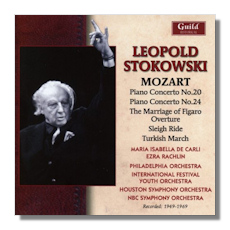
The Internet's Premier Classical Music Source
Related Links
- Mozart Reviews
- Latest Reviews
- More Reviews
-
By Composer
-
Collections
DVD & Blu-ray
Books
Concert Reviews
Articles/Interviews
Software
Audio
Search Amazon
Recommended Links
Site News
 CD Review
CD Review
Wolfgang Mozart

Stokowski Conducts Mozart 1949-1969
- Overture "The Marriage of Figaro" 1
- Piano Concerto #20 in D minor, K. 466 2
- Sleigh Ride (German Dance #3, K. 605 #3 "Die Schlittenfahrt") 3
- Piano Concerto #24 in C minor, K. 491 4
- Turkish March (Piano Sonata #11 in A Major, K. 331 III) 5
2 Maria Isabella De Carli, piano
4 Ezra Rachlin, piano
1 Philadelphia Orchestra/Leopold Stokowski
2 International Festival Youth Orchestra/Leopold Stokowski
3 Stokowski Symphony Orchestra/Leopold Stokowski
4 Houston Symphony Orchestra/Leopold Stokowski
5 NBC Symphony Orchestra/Leopold Stokowski
1 12 February 1960. Live broadcast. Stereo
2 31 August 1969. Stereo
3 12 March 1949. Mono.
4 24 October 1960. ?
5 9 February 1955. Mono.
Guild GHCD2405
The music of Mozart did not play a significant role in establishing the reputation of Leopold Stokowski. To say he ignored Classical period works would be inaccurate, but his legacy certainly rests more on the Romantic repertoire. This disc from Guild is valuable in that it preserves the great conductor's Mozart, but it also shows him as a concerto collaborator, a rare role for Stokowski.
A brash and extroverted Overture opens the program. Recorded in 1960 upon his long-awaited return to Philadelphia after nearly two decades away, there is nothing especially unusual about it. We should remember that Eugene Ormandy (then music director) conducted very little Mozart on disc, either. Certainly this is very beautiful music making, but it's a bit heavy for modern tastes. Still, 50 years later, the Philadelphia strings and winds remain the envy of the musical world. More important in terms of musicality and the conductors' discography are the two concertos, both in a minor key. Of the two, the Concerto #20 goes better. I am amazed at how Stokowski was able to impose his "signature sound" upon these youthful charges. While there are plenty of imperfections, the richness of the strings is certainly indicative of a Stokowski performance. And De Carli also proves an able soloist. The Concerto #24 finds assistant conductor Ezra Rachlin at the piano, in a live broadcast from Houston. And we do indeed have problems here, largely at the feet of the conductor. The framework is uncomfortably heavy and unidiomatic. Rachlin was a fine overall musician, and this remains a valuable document. It's just not great Mozart.
The two fillers are practically "a tale of two Stokowskis" In the German Dance, this is less a "Sleigh Ride" and more of pushing a cart out of the snow. As in Houston, the textures are rather thick, and the playing from the New York pickup band is adequate at best. On the other hand, this Turkish March is dressed up and ready for a night on the town! I'm not sure if it's the old man's own transcription, but it sure is wacky. And in 1955, this is still very much Toscanini's old band. There's an incisive and rather hard-hitting quality among all the embellishment that I find rather endearing. While the sound varies tremendously throughout the program, this is still great fun, and an unexpected pleasure.
Copyright © 2014, Brian Wigman




















